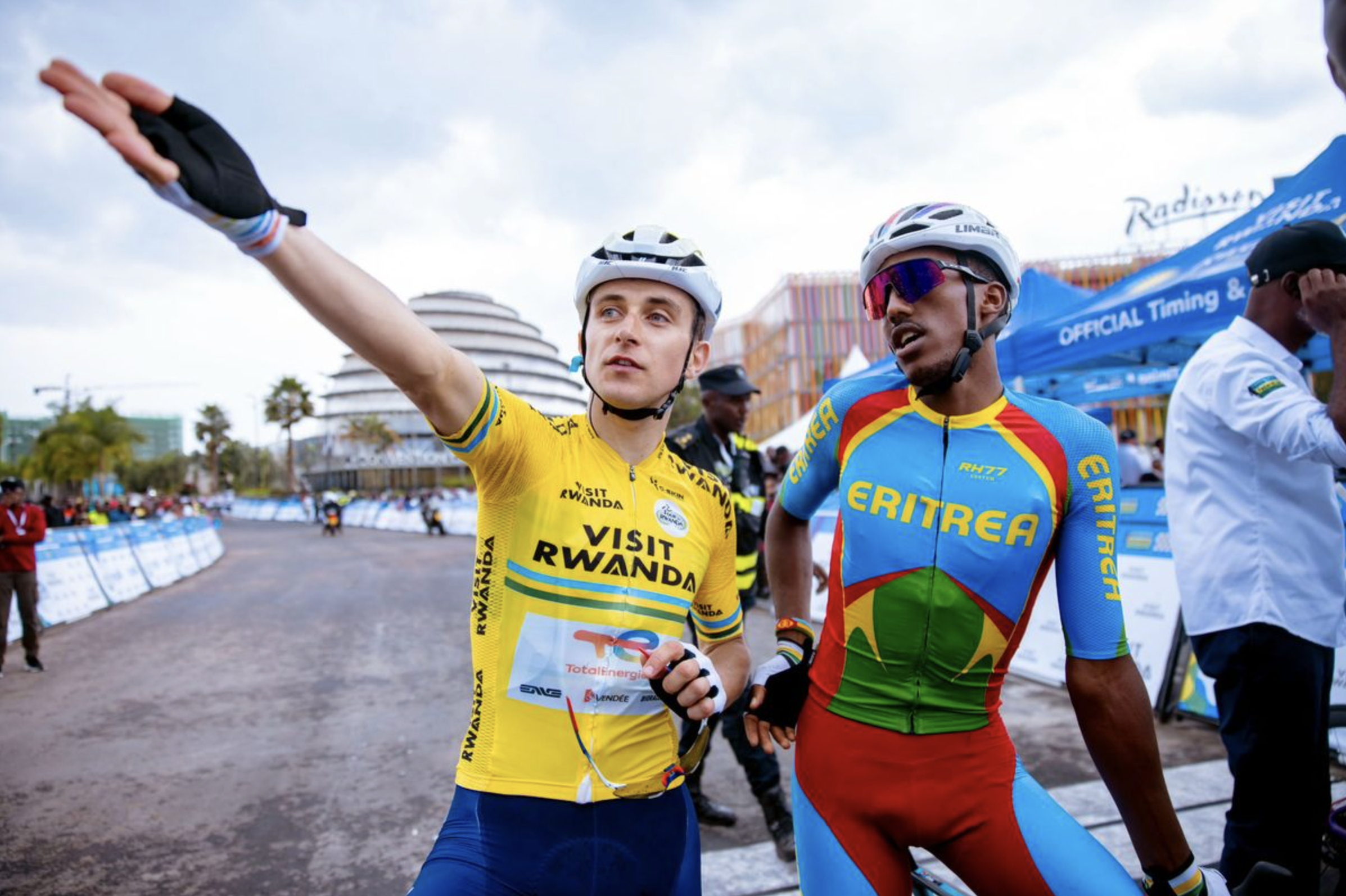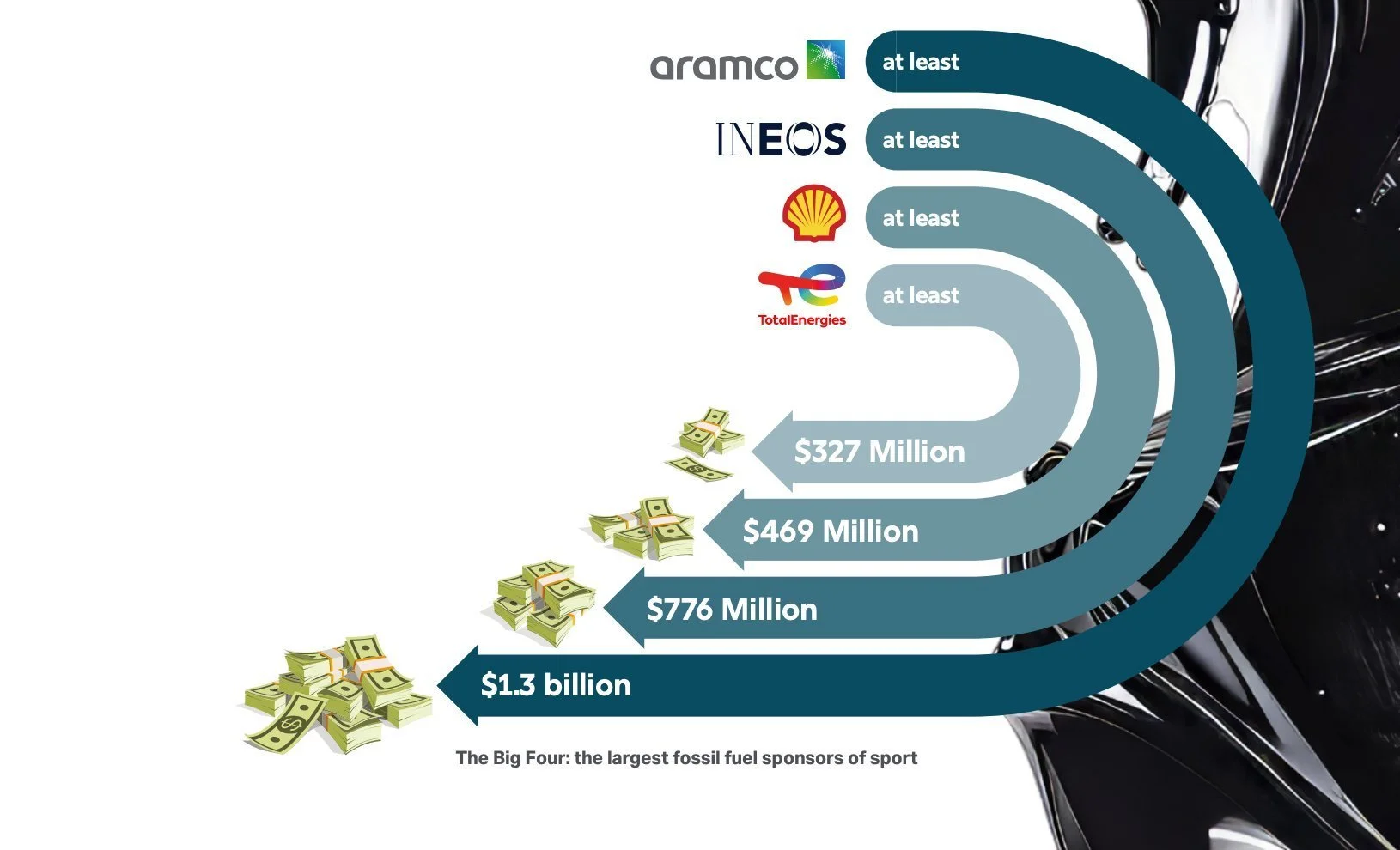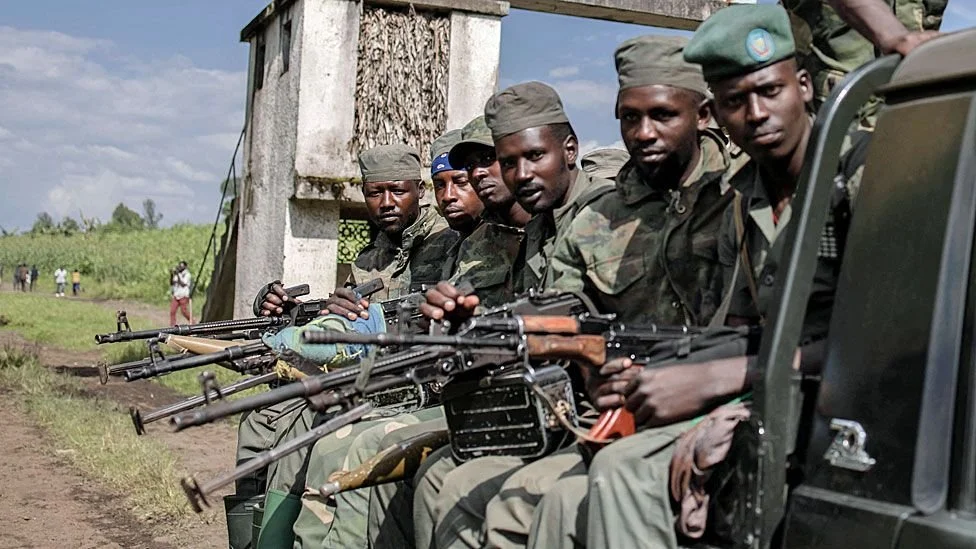Cycling’s climate and sponsorship crises converge at Tour du Rwanda
The threats posed by fossil fuels to the climate, extreme weather to outdoor sport, and fossil-fuel sponsorship to the integrity of sport, converged on the recent Tour du Rwanda bicycle race.
Fabien Doubey won the Tour du Rwanda 2025 (Image credit: Tour du Rwanda / X)
Extraordinary scenes marred the last stage of the 2025 Tour du Rwanda on Sunday 2 March. A nail-biting finish was expected. Instead, the race ground to a halt in controversial circumstances, as strong winds and thunderstorms closed in.
After six stages, the race leader was the French rider Fabien Doubey of Team TotalEnergies, sponsored by Africa’s biggest hydrocarbon producer. Second was Eritrea’s Henok Mulubrhan, the three-time and reigning African Continental Road Champion, riding for the XDS Astana Team, part-sponsored by the oil and gas giant Kazakhstan.
In stage six, Mulubrhan had made up six seconds on Doubey, but, to win the race, he still had a six-second deficit to close. However, things did not unfold as he would have liked.
The seventh and final stage began in pouring rain. The itinerary included much of the circuit which will be used in the UCI Road World Championships on 21-28 September, and the stage doubled as a test-event, with a delegation from cycling’s world-governing body, the UCI, looking on.
On the first corner, 20-30 riders crashed, causing a long neutralisation. As mud slides descended and a cobbled section became unrideable, the route was modified to allow racing to continue. Unfortunately for Mulubrhan, these changes seems to remove the strategic sectors where he might have tried to regain the missing seconds.
At the start of the final lap, video footage clearly shows the race leader organising his TotalEnergies team-mates into a line across the road and interacting other riders that they were stopping the race, without the authorisation of the race commissaires. Mauro Cuylits of the Lotto Development Team, one of six riders who were in the breakaway, been seen banging his handlebars in frustration when he is told that the race has been abandoned. At the time of the stoppage, it was not raining. The riders were not even wearing wet weather clothing.
An enraged Mulubrhan told the French sports daily L’Équipe, ”It suited him [Doubey] just fine that there was no stage today. The race would never have stopped because of a few drops of rain in Europe.” Belgium’s Milan Donie of the Lotto Development Team agreed: “If we are cancelling this stage here, there wouldn't be a single race in Flanders. Wet and slippery cobbles don't stop races there.”
The commissaires fined Fabien Doubey 2000 Swiss francs for ‘inappropriate and improper behaviour or damage to the image of the sport’. Any time penalty could cost him the race win.
Of course, physical obstructions to stop races are not new, although in recent years they have generally been associated with climate protestors, not riders. Bad weather too is nothing new, although TotalEnergies, the Kazakh petrochemicals industry, and the many other fossil fuel producers which have moved into cycling do much to damage the very sports they sponsor.
Image: New Weather Institute, ‘Dirty Money: How Fossil Fuel Sponsors are Polluting Sport’
The International Energy Agency (IEA) has declared that, to achieve net-zero emissions by 2050, the world must "leave fossil fuels in the ground.” Yet TotalEnergies continues to invest in new drilling projects. Its delayed Mozambique Liquid Natural Gas project alone, a US$20 billion investment when it secured funding in 2020 – the largest ever direct foreign investment in Africa at the time – is forecast to emit between 3.3 and 4.5 billion tonnes of CO2 equivalent over its lifetime, i.e., more than the combined annual greenhouse gas emissions of all 27 European Union countries.
The official sponsor in 2023 of the Rugby World Cup and the 2023 African Cup of Nations, and a planned sponsor of the 2024 Olympics until the Paris Mayor called for an environmentally friendly Games, TotalEnergies is an enthusiastic user of sports sponsorship to greenwash its activities.The NGO Global Witness calculates that, from 2016 to mid-2024, TotalEnergies has produced enough oil and gas to send the mind-boggling quantity of 2.6 billion tonnes of CO2 emissions into the atmosphere since the Paris Agreement was adopted in 2015.
Andrew Simms, director of think tank the New Weather Institute, said: “While TotalEnergies uses cycling to sportwash its image as a major polluter, the company's core business of burning fossil fuels is causing chaos in the very sport it sponsors, and threatens its future. Having an oil and gas company sponsor in cycling, which should be a green sport showing the way ahead for cleaner transport, is like having a cigarette company sponsor health education in schools. When cycling accepts such deals it is blowing smoke in the faces of its own riders and ripping up the road to a climate safe world. You might as well throw nails across the road in the path of the cyclists as be sponsored by oil and gas. These deals need sweeping away."
As for Kazakhstan, despite its assiduous use of sports sponsorship to greenwash its reputation, its climate targets and policies are rated “insufficient” by the independent scientific website Climate Action Tracker, which finds that “Kazakhstan will not meet its climate targets, as emissions will grow until 2035 (at least) under current policies. As a result, the CAT rates Kazakhstan’s overall climate action as ’Insufficient’.”
The Mozambique Liquid Natural Gas project was delayed after disputed elections in Mozambique, described by European Union observers as “marked by anomalies and serious flaws,” led to violence and insurgency in Mozambique, close to TotalEnergies sites. The company has indicated there may be hope of a turnaround soon, following the deployment of thousands of Rwandan troops in Mozambique.
Rwanda has also been active in Kivu, a mineral-rich Congolese territory on the Rwandan border. There, the Rwandan government is supporting the Tutsi rebel group M23, led by a Congolese Tutsi who previously fought in the Rwandan army. The Tutsi ethnic group was targeted by Hutu extremists in the Rwanda genocide in 1994, which ended when a Tutsi-led force commanded by Paul Kagame. Kagame was Rwanda's Vice President, Minister of Defence and de facto leader under President Pasteur Bizimungu from 1994 to 2000, after which the vice-presidential post was abolished and Kagame became President, a post he still holds.
M23 rebels in DR Congo. Image: AFP
More than 3,000 people are thought to have been killed in Goma, with more than 800,000 displaced by the situation, according to the joint motion for a resolution from the European Parliament.
Given the security concerns, some teams refused to compete in the Tour of Rwanda. Soudal Quick-Step, the team of double Olympic champion Remco Evenepoel, was due to field its development squad, but stated in a press release: “We decided not to send 20 people there without absolute guarantees that the event could take place in complete safety.”
MEP Hilde Vautmans (Open Vld, Belgium), Chair of the Delegation to the Africa-EU Parliamentary Assembly and Renew Europe Group’s Coordinator in the Committee on Foreign Affairs, who led the negotiations on the resolution, said:
"We have all seen the chilling images. Images of murdered mums with tiny babies in their arms. The reality there is horrific.
That is why we adopted a strong resolution, carried by a broad majority. The European Parliament calls for sanctions against those responsible for the violence, but also against Rwanda as a country in breach with international law. We want complete freeze of all European aid to Rwanda (including Global Gateway Funding) and the cancellation of the 2025 Cycling Championships in Kigali.
The European Commission and the member states should get humanitarian aid going, secured by a strengthened UN mandate for peacekeeping to restore stability in the region."
UCI chairman David Lappartient insists that the 2025 World Championships will go ahead. “There is no plan B,” he is telling journalists. Extreme weather, and security issues, can perhaps be avoided at the World Championships in September. But for two decades, cycling has been seeking financial partners in oil companies, petro-states and repressive regimes where the threat of violence is never far away. As long as it keeps such company, cycling will continue to lurch from sporting crisis to climate crisis in a fossil-fuelled spin.
-
By Matt Rendell, Badvertising




